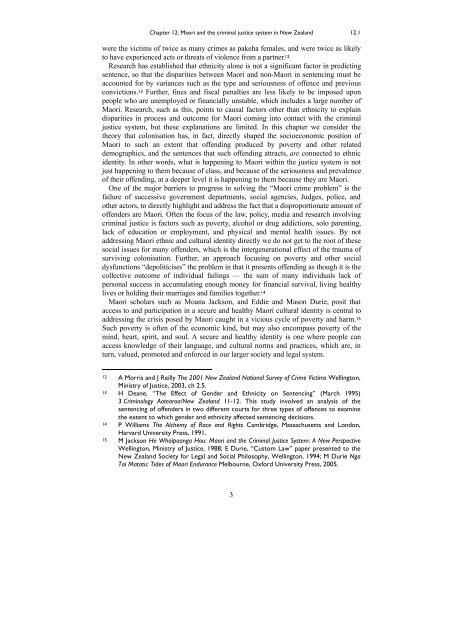QUINCE, K "MÄori and the Criminal Justice System in New Zealand"
QUINCE, K "MÄori and the Criminal Justice System in New Zealand"
QUINCE, K "MÄori and the Criminal Justice System in New Zealand"
Create successful ePaper yourself
Turn your PDF publications into a flip-book with our unique Google optimized e-Paper software.
Chapter 12: Maori <strong>and</strong> <strong>the</strong> crim<strong>in</strong>al justice system <strong>in</strong> <strong>New</strong> Zeal<strong>and</strong> 12.1<br />
were <strong>the</strong> victims of twice as many crimes as pakeha females, <strong>and</strong> were twice as likely<br />
to have experienced acts or threats of violence from a partner. 12<br />
Research has established that ethnicity alone is not a significant factor <strong>in</strong> predict<strong>in</strong>g<br />
sentence, so that <strong>the</strong> disparities between Maori <strong>and</strong> non-Maori <strong>in</strong> sentenc<strong>in</strong>g must be<br />
accounted for by variances such as <strong>the</strong> type <strong>and</strong> seriousness of offence <strong>and</strong> previous<br />
convictions. 13 Fur<strong>the</strong>r, f<strong>in</strong>es <strong>and</strong> fiscal penalties are less likely to be imposed upon<br />
people who are unemployed or f<strong>in</strong>ancially unstable, which <strong>in</strong>cludes a large number of<br />
Maori. Research, such as this, po<strong>in</strong>ts to causal factors o<strong>the</strong>r than ethnicity to expla<strong>in</strong><br />
disparities <strong>in</strong> process <strong>and</strong> outcome for Maori com<strong>in</strong>g <strong>in</strong>to contact with <strong>the</strong> crim<strong>in</strong>al<br />
justice system, but <strong>the</strong>se explanations are limited. In this chapter we consider <strong>the</strong><br />
<strong>the</strong>ory that colonisation has, <strong>in</strong> fact, directly shaped <strong>the</strong> socioeconomic position of<br />
Maori to such an extent that offend<strong>in</strong>g produced by poverty <strong>and</strong> o<strong>the</strong>r related<br />
demographics, <strong>and</strong> <strong>the</strong> sentences that such offend<strong>in</strong>g attracts, are connected to ethnic<br />
identity. In o<strong>the</strong>r words, what is happen<strong>in</strong>g to Maori with<strong>in</strong> <strong>the</strong> justice system is not<br />
just happen<strong>in</strong>g to <strong>the</strong>m because of class, <strong>and</strong> because of <strong>the</strong> seriousness <strong>and</strong> prevalence<br />
of <strong>the</strong>ir offend<strong>in</strong>g, at a deeper level it is happen<strong>in</strong>g to <strong>the</strong>m because <strong>the</strong>y are Maori.<br />
One of <strong>the</strong> major barriers to progress <strong>in</strong> solv<strong>in</strong>g <strong>the</strong> “Maori crime problem” is <strong>the</strong><br />
failure of successive government departments, social agencies, Judges, police, <strong>and</strong><br />
o<strong>the</strong>r actors, to directly highlight <strong>and</strong> address <strong>the</strong> fact that a disproportionate amount of<br />
offenders are Maori. Often <strong>the</strong> focus of <strong>the</strong> law, policy, media <strong>and</strong> research <strong>in</strong>volv<strong>in</strong>g<br />
crim<strong>in</strong>al justice is factors such as poverty, alcohol or drug addictions, solo parent<strong>in</strong>g,<br />
lack of education or employment, <strong>and</strong> physical <strong>and</strong> mental health issues. By not<br />
address<strong>in</strong>g Maori ethnic <strong>and</strong> cultural identity directly we do not get to <strong>the</strong> root of <strong>the</strong>se<br />
social issues for many offenders, which is <strong>the</strong> <strong>in</strong>tergenerational effect of <strong>the</strong> trauma of<br />
surviv<strong>in</strong>g colonisation. Fur<strong>the</strong>r, an approach focus<strong>in</strong>g on poverty <strong>and</strong> o<strong>the</strong>r social<br />
dysfunctions “depoliticises” <strong>the</strong> problem <strong>in</strong> that it presents offend<strong>in</strong>g as though it is <strong>the</strong><br />
collective outcome of <strong>in</strong>dividual fail<strong>in</strong>gs — <strong>the</strong> sum of many <strong>in</strong>dividuals lack of<br />
personal success <strong>in</strong> accumulat<strong>in</strong>g enough money for f<strong>in</strong>ancial survival, liv<strong>in</strong>g healthy<br />
lives or hold<strong>in</strong>g <strong>the</strong>ir marriages <strong>and</strong> families toge<strong>the</strong>r. 14<br />
Maori scholars such as Moana Jackson, <strong>and</strong> Eddie <strong>and</strong> Mason Durie, posit that<br />
access to <strong>and</strong> participation <strong>in</strong> a secure <strong>and</strong> healthy Maori cultural identity is central to<br />
address<strong>in</strong>g <strong>the</strong> crisis posed by Maori caught <strong>in</strong> a vicious cycle of poverty <strong>and</strong> harm. 15<br />
Such poverty is often of <strong>the</strong> economic k<strong>in</strong>d, but may also encompass poverty of <strong>the</strong><br />
m<strong>in</strong>d, heart, spirit, <strong>and</strong> soul. A secure <strong>and</strong> healthy identity is one where people can<br />
access knowledge of <strong>the</strong>ir language, <strong>and</strong> cultural norms <strong>and</strong> practices, which are, <strong>in</strong><br />
turn, valued, promoted <strong>and</strong> enforced <strong>in</strong> our larger society <strong>and</strong> legal system.<br />
12 A Morris <strong>and</strong> J Reilly The 2001 <strong>New</strong> Zeal<strong>and</strong> National Survey of Crime Victims Well<strong>in</strong>gton,<br />
M<strong>in</strong>istry of <strong>Justice</strong>, 2003, ch 2.5.<br />
13 H Deane, “The Effect of Gender <strong>and</strong> Ethnicity on Sentenc<strong>in</strong>g” (March 1995)<br />
3 Crim<strong>in</strong>ology Aotearoa/<strong>New</strong> Zeal<strong>and</strong> 11-12. This study <strong>in</strong>volved an analysis of <strong>the</strong><br />
sentenc<strong>in</strong>g of offenders <strong>in</strong> two different courts for three types of offences to exam<strong>in</strong>e<br />
<strong>the</strong> extent to which gender <strong>and</strong> ethnicity affected sentenc<strong>in</strong>g decisions.<br />
14 P Williams The Alchemy of Race <strong>and</strong> Rights Cambridge, Massachusetts <strong>and</strong> London,<br />
Harvard University Press, 1991.<br />
15 M Jackson He Whaipaanga Hou: Maori <strong>and</strong> <strong>the</strong> <strong>Crim<strong>in</strong>al</strong> <strong>Justice</strong> <strong>System</strong>: A <strong>New</strong> Perspective<br />
Well<strong>in</strong>gton, M<strong>in</strong>istry of <strong>Justice</strong>, 1988; E Durie, “Custom Law” paper presented to <strong>the</strong><br />
<strong>New</strong> Zeal<strong>and</strong> Society for Legal <strong>and</strong> Social Philosophy, Well<strong>in</strong>gton, 1994; M Durie Nga<br />
Tai Matatu: Tides of Maori Endurance Melbourne, Oxford University Press, 2005.<br />
3

















